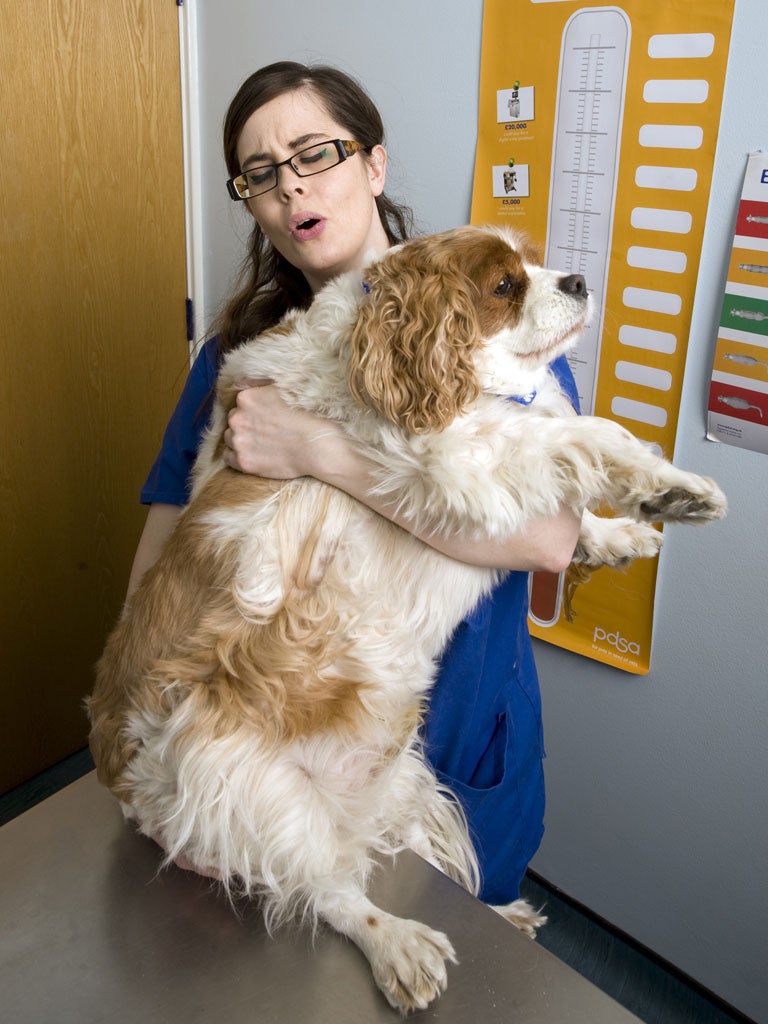Dangerous diets of our fat cats and hefty hounds
Animal welfare group says there are now six million severely overweight cats and dogs in Britain

Meet Fifi. She's no ordinary cat. In fact, at more than 9kg she is the size of two normal cats put together. Fifi (pictured below) will do whatever it takes to get food: pestering people into feeding her; stealing from other cats and even helping herself to bird food from the garden.
While the sheer size of Fifi and her elaborate efforts to eat may appear comical, she is an example of a growing health crisis among Britain's pets, according to the People's Dispensary for Sick Animals (PDSA), an animal welfare charity.
Another example of the animal obesity epidemic is Jumbo Jack, a springer spaniel whose love of food has led him to tip the scales at 22kg instead of the normal 10kg. Deco, a golden Labrador, weighs 55kg – virtually double what he should be. Perhaps his finest hour was getting through 36 buns in one sitting, although he did leave the empty cases lined up on the kitchen floor. In an attempt to stop him from eating everything in sight, his desperate owner has installed a safety gate to keep him out of the kitchen.
Behind the wry tales of greedy pets lies a serious issue, with millions of animals being overfed and dying earlier than they should, campaigners claim. One in three dogs and one in four cats are obese. That equates to 5.9 million fat pets staggering around the streets of Britain – 2.9 million dogs and three million cats.
People giving their animals too many treats instead of taking them for walks and not controlling their diet are among the causes.
The consequences can be fatal, with overweight animals at high risk of heart disease, diabetes, arthritis and early death – two years early in the case of dogs. Pet owners should take their animals for exercise rather than always giving them treats, and should carefully monitor their pets' weight and food intake, according to the British Veterinary Association.
Getting that warning across to animals that like nothing better than eating is another matter.
To this end, animal welfare experts have attempted to get the message across to owners with the equivalent of a fat camp for animals. Some 18 contenders will find out on Thursday whether they have won the coveted pet slimming award organised by the PDSA. Care will be needed to make sure the winner doesn't relapse: the prize includes a year's supply of pet food.
Among the fancied contenders is Rottweiler Molly, who weighs 65kg. "I was in denial about how big Molly was," admits her owner Wayne Houlston, from Barnsley. "We didn't realise how serious it was until she had problems with her back legs and she couldn't stand up properly."
And Skippy, a springer spaniel, would regularly join the family for a Sunday roast. He ended up weighing 31kg. His owner, Marilyn Smith from Pontyclun, said: "In the past we would have a cooked dinner on a Sunday and he would have had his very own one served up in his own bowl as well. But all of that has stopped now that we know the harm it's doing him."
Sharon Dowman, from Basildon, has fought a running battle to get her monster cat, 9.7kg Mini-Moo, to lose weight. "She was grumpy at the start and one time I was having some sausages and she nicked one. She has lost weight though and she likes the diet food, so we're getting there."
People need to take the issue seriously, says Sean Wensley, a senior vet at the PDSA: "Pet obesity is a serious and widespread health and welfare issue. It's the most common medical disease that vets see now, When people see underweight animals they often see that as a welfare issue, whereas when they see an overweight pet often their instinct is to find it funny and that's a perception that we are trying to challenge."
Most vet surgeries now run free weight clinics where people can get their pets checked.
Serial offender Fifi is finally starting to shift the weight. But it could prove to be a mixed blessing.
"She can also now jump up easily onto the counter," said her owner, Monica Bottomley from Bradford. "I have to be even more careful that she doesn't steal my other cat's food!"
Subscribe to Independent Premium to bookmark this article
Want to bookmark your favourite articles and stories to read or reference later? Start your Independent Premium subscription today.

Join our commenting forum
Join thought-provoking conversations, follow other Independent readers and see their replies